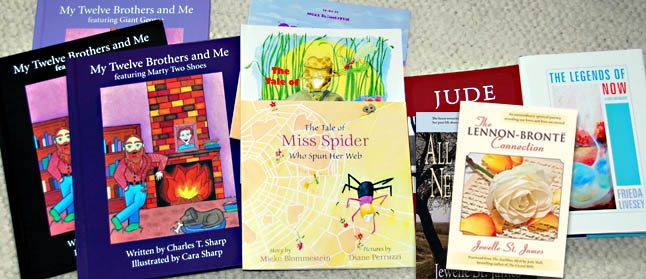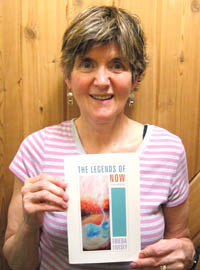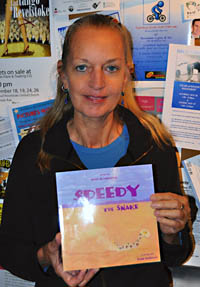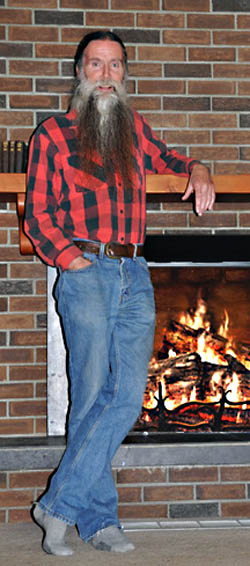
By Leslie Savage
Mieke Blommestein. Three children’s books: The Tale of Miss Spider Who Spun Her Web; Speedy the Snake; and The Tale f Charlie the Toad. All are illustrated by Diane Perruzzi . Revelstoke: Sojourner Publishing.
Frieda Livesey. The Legends of Now: A Love Anthology. Victoria: Friesen Press, , 2011.
Jewelle St. James. Jude: My Reincarnation from Auschwitz. Revelstoke: St. James Publishing, 2006.
Charles T. Sharp. Three children’s books: My Twelve Brothers and Me featuring Creely; My Twelve Brothers and Me featuring Ned the Noodle; My Twelve Brothers and Me featuring Marty Two Shoes. All are illustrated by Cara Sharp. Revelstoke: Second Crossing Investment Corporation.
Writers in Revelstoke show a wide range of talents and work in just as wide a range of genres: from children’s books to academic texts, short fiction, memoir/autobiography, journalism, environmental reports and inspirational literature. Here’s a sampler of what is available at Grizzly Books and Serendipity Shop currently — and without particular regard for genre, although as we’ll see, there is a common theme.
Living in Revelstoke, our lives are usually integrated in some way with nature: the mountains are our visual backdrop, the skies our key to the weather and therefore how our days will evolve; the rivers and streams remind us of both continuity and the ebb and flow of life. Nature has its own set of innocence as well as violence and cruelty. Not surprising then, that in some ways nature — what we’re born with and also how we transcend it — plays a central part, in one way or another, in these books by Revelstoke writers.
An Edenic quality touches these books, whose focus is personal transcendence through universal love discovered, found or taught, in one way or another. “Allow universal love to float with you and around you,” Friesen tells us in The Legends of Now. “This love will support and nurture you and will guide you to a safe harbour in times of need and darkness.”

The Legends of Now is a sampler of “fragments,” the genre that critic Octavio Paz says is a “vivid expression of our time, and the form most accurately reflective our contemporary life. Livesey’s fragments include poems, prayers, stories cast as allegory, meditations and lessons. At times, the fragments are richly rewarding with some inspired lyrical lines such as
Mark this song with gales of laughter, sift it slowly in the wind…
and this delightful take on Twinkle Twinkle:
Twinkle Twinkle little star
Never wonder who you are
You are love and you are light
Guided through the darkest night
Lift the veil and find your fire
Love is always your desire.
Some stories are less lyric and more didactic. Meet for instance Fred the Giraffe, with his heart of happy jelly, Alfred Alligator whose thinker is sore, the Rabbit fearful, the Lizard wise. And of course the Python whose interest in Rabbit is nothing personal — especially as he is “full of zebra.” At the same time, rabbit’s fear of Python is “a little bit personal.” And rabbit overcomes his fear and lives in the garden with python his whole life through, as a result of learning to trust the lesson of awareness of universal love.
Well, maybe. I have to confess, though, that if I were a mother who had lost a child, a woman undergoing chemo and radiation for aggressive lymphoma, or the child of a parent diagnosed with ALS, I’m not sure that universal love would be foremost in my mental landscape. I might be the zebra, eaten by the python. We don’t hear about his fear.
This is a gentle book, at times perhaps overly self-focused, but each fragment is intended as a guide to growing awareness of self and the world. As meditations, these fragments are best read one day at a time — this is a book to be savoured over time. Livesey celebrates life in an environment where walks by the river and catnaps under the trees are possible, where open fields, star-gazing and simple acts such as listening to the wind are not merely visual or tactile images, but are metaphors for spiritual opening.
Somewhat similar in perspective, Mieke Blommenstein’s children’s books use characters from nature to animate a vision of universal

acceptance and love gently wrapped in short lessons. Mieke’s web site tells us that these are stories channeled by her spirit guide.
Miss Spider is torn between two voices in her head: the angry, hungry voice that tells her to eat that darned fly caught in her web, and a softer, gentler voice that urges compassion for the fly. A butterfly counsels love rather than hunger and desire.
In Charlie the Toad’s story, Charlie starts out miserable because he is so ugly. Along comes Gwendolyn the grasshopper who teaches him to be still, to feel the sun in his heart, and Charlie is transformed. Speaking directly to readers, the author tells them they too can overcome sadness by the simple act of being still and feeling the sunlight.
In Speedy the Snake, the lesson is about overcoming the fear of change by trusting in oneself.
All these stories are illustrated by Diane Perruzzi, whose style of watercolour painting is both charming and somewhat spare. In all of them, the lesson gently told to small children is that love, trust, compassion and stillness are there to help children meet the challenges they meet in the world outside their own homes. All show the animals out in the wide world, a place depicted as fraught with danger but ultimately, through focused direction of thought and feeling, a place a beauty and harmony.

Jewelle St. James most recent book Jude: My Reincarnation from Auschwitz (2006), also taps into a notion of universal love, albeit somewhat removed from the simplicity we see in the work of Blommenstein and Livesey. For St. James, “love is constant through physical lives and deaths,” and the soul of each one of us “wants to heal and reclaim” the power of love in an “enchanting transformation.”
St. James’s earlier work, All You Need is Love (2003, 2nd edition 2009) tells about how she discovered through spiritual journeys and soul work that her former lover in past times was reincarnated as John Lennon; her latest work, The Lennon-Bronte connection, postulates that John Baron also came back as the brother of Emily and Charlotte Bronte.
She uses meditation, automatic writing and spiritual guidance resulting in deep intuitive insights to find her past life as a 19-year-old Jewish girl imprisoned at Auschwitz by the SS during the Second World War. The search involves several lifetimes over 300 years. For those open to the idea of reincarnation, this is a fascinating story of a woman whose search for her past continues with the help of her pyschic healer Thérèse, her Reiki master Frieda Livesey, and her spirit guide John Baron.
Chic Sharp is known to Revelstokians as a Karate master and teacher, and now as the author with the longest beard and the most colourful

books in town. Illustrated by his daughter Cara, the Twelve Brothers and Me series are delightful tales of daring and adventure — despite the fact that all twelve brothers except the “Me” in the end disappear. But that doesn’t faze the narrator, who seems to know that somehow, the brothers are doing just fine, wherever they are. (The author, by the way, has two real life siblings, both very much with us in the here and now.)
The first fictional brother, Creely, was surfing on a giant maple-frosted bun when a huge wave swept him out to sea. The second brother, Marty Two Shoes, disappeared around a corner, never to be seen again. The third story involves Giant George, and I won’t tell you what happens to him. These tales benefit from the sense of familiarity that comes when children recognize the characters in a family — it’s a brilliant way to create a series, and Cara Sharp’s lively and colourful cartoons provide illustrations to match the well-paced story texts. Both the stories and the images radiate a vision of the world in which the narrator’s love for his twelve disappearing brothers leaps out of the pages.
Ultimately, these books are about “a world just beside ours, a world that touches ours in places, where all the people with giant hearts live and watch over us, giving us strength and courage when we most need it.” This is from Sharp’s Giant George book, and I like to think that Mieke, Jewelle and Frieda would all agree.



